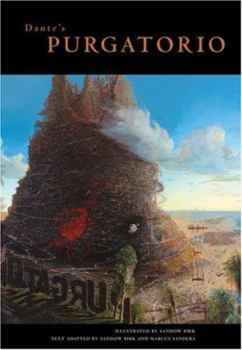Dante's Purgatorio
Select Format
Select Condition 
Book Overview
Following the acclaim for their innovative edition of Dante's Inferno , Sandow Birk and Marcus Sanders guide us to the next level of the afterlife in Dante's Purgatorio . The second book of Dante... This description may be from another edition of this product.
Format:Paperback
Language:English
ISBN:0811847195
ISBN13:9780811847193
Release Date:May 2005
Publisher:Chronicle Books
Length:240 Pages
Weight:2.20 lbs.
Dimensions:1.0" x 1.0" x 1.0"
Customer Reviews
1 rating
Medieval vision of the afterlife
Published by Thriftbooks.com User , 17 years ago
This was required reading for a graduate course in medieval history. "The Divine Comedy" describes Dante's journey through Hell (Inferno), Purgatory (Purgatorio), and Paradise (Paradiso), guided first by the Roman epic poet Virgil and then by Beatrice, the subject of his love and another of his works, "La Vita Nuova." While the vision of Hell, the Inferno, is vivid for modern readers, the theological niceties presented in the other books require a certain amount of patience and scholarship to understand. Purgatorio, the most lyrical and human of the three, also has the most poets in it; Paradiso, the most heavily theological, has the most beautiful and ecstatic mystic passages in which Dante tries to describe what he confesses he is unable to convey (e.g., when Dante looks into the face of God: "all'alta fantasia qui mancò possa" - "at this high moment, ability failed my capacity to describe," Paradiso, XXXIII, 142). Dante wrote the Comedy in his regional dialect. By creating a poem of epic structure and philosophic purpose, he established that the Italian language was suitable for the highest sort of expression, and simultaneously established the Tuscan dialect as the standard for Italian. In French, Italian is nicknamed la langue de Dante. Publishing in the vernacular language marked Dante as one of the first (among others such as Geoffrey Chaucer and Giovanni Boccaccio) to break from standards of publishing in only Latin or Greek (the languages of Church and antiquity). This break allowed more literature to be published for a wider audience - setting the stage for greater levels of literacy in the future. Readers often cannot understand how such a serious work may be called a "comedy". In Dante's time, all serious scholarly works were written in Latin (a tradition that would persist for several hundred years more, until the waning years of the Enlightenment) and works written in any other language were assumed to be comedic in nature. Furthermore, the word "comedy," in the classical sense, refers to works which reflect belief in an ordered universe, in which events not only tended towards a happy or "amusing" ending, but an ending influenced by a Providential will that orders all things to an ultimate good. By this meaning of the word, the progression of Dante's pilgrim from Hell to Paradise is the paradigmatic expression of comedy, since the work begins with the pilgrim's moral confusion and ends with the vision of God. The Divine Comedy can be described simply as an allegory: Each canto, and the episodes therein, can contain many alternate meanings. Dante's allegory, however, is more complex, and, in explaining how to read the poem (see the "Letter to Can Grande della Scala"), he outlines other levels of meaning besides the allegory (the historical, the moral, the literal, and the anagogical). The structure of the poem, likewise, is quite complex, with mathematical and numerological patterns arching throughout the work, particu




